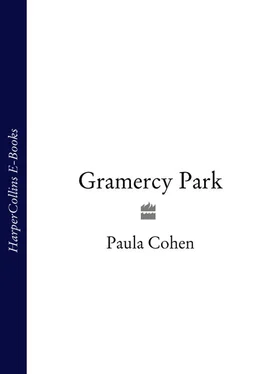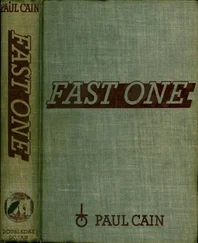The combined strength of the doctor and the girl’s maid were needed to get her back to her own room. She had fought them wildly in her efforts to stay with her guardian, seemingly unwilling, or unable, to believe that he was truly dead. Even after they forced her to he down, and a sedative had been administered, she continued to cry. What had been most terrible, however, and a sure sign that her mind had become unbalanced, were the fits of laughter that had alternated with her tears. The doctor, being a prudent man, had stayed with her until she fell asleep, and had kept her heavily sedated for the next few days. He had also refused to allow her to attend the funeral.
Thus was New York cheated of seeing, up close and lacking the shield of her guardian’s protective arm, the little Jewess who was expected to inherit all of her guardian’s very great fortune.
So affected was she, in fact, by Slade’s passing, that the reading of the will had to be postponed for a full month, there being genuine concern about her health. It was not until late March, therefore, on a gray and chilly morning, that the lawyers, led by one Thaddeus Chadwick, Esq., the late Mr. Slade’s personal attorney and oldest friend, had appeared in Mr. Slade’s library to unseal and read his final intentions, and to announce to the waiting ears of New York the advent of an heiress—the city’s newest, and possibly one of the richest, if rumors about the size of the Slade estate were to be believed.
Clara entered the room last of all. Still six months shy of her twentieth birthday, she was not yet fully recovered from the shock of her guardian’s death, and her skin had an unhealthy, chalk-white pallor made even whiter by the severity of her black dress and dark hair. That within minutes she might be one of the world’s wealthiest women seemed incongruous, at best; there was simply nothing about her that could serve to explain Slade’s interest in her. Certainly, there was nothing
evident that morning, as she slipped quietly into her chair. She looked as plain and as ordinary as a shop girl, with her small, pinched face and nervous, nail-bitten hands. Only her enormous eyes, bright with unshed tears, lifted her from the realm of the commonplace.
Immediately after her arrival, the library doors were closed, shutting off the proceedings from the eyes of the servants who lingered nearby, finding more to do in the vicinity than could possibly be accounted for by their usual round of morning duties. For twenty minutes the only sound to reach their ears was the dry hum of Chadwick’s voice from behind the huge ebony doors. Then, suddenly, in the expectant hush there was another sound; a sound so out of place, so inappropriate in that house of mourning, that the hovering servants stared at one another, shocked, and one Irish housemaid, more devout than the rest, made the sign of the cross.
Laughter. Girlish laughter, which did not remain girlish long. Low at first, and musical, it rose swiftly, becoming high and strident: peal after sobbing peal of mirthless, helpless, hysterical laughter.
The heavy doors banged back; Chadwick and his colleagues, ashen-faced, hurried from the room. Within the library, tiny, shy, quiet Clara Adler sat and rocked, tears streaming down her face, laughing the laugh of a demented thing.
Once more a servant was sent flying for the doctor; once more the sedatives were administered. The lawyers went away shaking their heads, and the servants scattered to their separate duties, to whisper what they had seen and heard into the ears of fellow servants in other houses. By the next day all of New York knew that Slade’s ward had been struck down, and knew, too, what had caused it.
What many could not understand, however, was the laughter. Tears, perhaps, but never laughter. Clara Adler, taken in by Henry Ogden Slade at the tender age of fifteen, and reared and educated as his daughter for the four years until his death, had been dispossessed, utterly and completely. Her name had not even been mentioned in his will. It was as if she had never existed.
Still, there was nothing funny—nothing funny at all—about losing thirty million dollars.
DEATH IS A GOOD TOPIC for conversation, and never better than when money is involved. The last, lingering illness, and all of it torments, are picked over with morbid glee; and the greater the suffering—the younger the victim—the more the head-wagging preoccupation with it.
The passing, therefore, of a young and innocent girl would elicit much discussion, in voices hushed and solemn, about life’s vicissitudes and the sudden, inexplicable workings of Fate. Should the girl be one about whom hung an air of mystery, and who had not even the consolation of the Christian faith to sustain her in her final hours, the pious platitudes would rain thick and fast, reminding all that even in the midst of life we are in death.
So New York listened for word of the end of Clara Adler, struck down by brain fever at the age of nineteen, in the spring of 1894, the fever brought on by the twin shocks of the loss of her guardian and his estate. The hysteria with which she had greeted the news of the latter had been the onset of her illness. She was not expected to recover.
It was all very sad—and very satisfactory—and the city settled in, with melancholy anticipation, to await her passing. It was no more than what any truly well bred young woman would have done in her place; and certainly there was nothing else for her, with propriety, to do. The only problem, as the days became weeks and the weeks became months, was that she did not do it …
FROM FIFTH AVENUE, with its gleaming carriages and fine, new mansions, and its smell of money only lately won and not yet fully grasped by the minds of its makers, it is merely a healthy stretch of the leg to Gramercy Park.
There, enclosed on four sides by a high, iron fence, a small oasis beckons the passerby: a graceful green rectangle of shady paths and wide, low benches scattered beneath trees thick with years. It is an odd sight: nature penned in amid a forest of brick and stone, and the innocent stranger might be tempted to pass through the black-barred gate, to spend a quiet hour in contemplation of such a wonder. But the gate is locked, and only the privileged few who live on the borders of the little park possess the key that will open it.
Life appears to be sweet for these keepers of the keys of this tiny Eden, and drudgery is evidently not their daily portion. On warm summer afternoons, one can see nursemaids wheeling the infant lords and ladies of the great Republic along the dappled paths, and spy daintily clad children at play beneath the gaze of vigilant nannies.
But the vulgarly obvious wealth of Fifth Avenue is missing here; these houses, for the most part, are vestiges of an earlier day. Red brick and white stone, they stand side by side with not even a handbreadth of space between them, forming a solid square of dignity, and those who dwell within them have no need of pomp to proclaim their worth to casual passersby. Like their houses, their wealth and power were built in bygone days, and possessing them has become a part of the natural order of things, occasioning no more thought than, say, breathing or sleeping. They know what they have, and that is all that matters.
Near the southeastern corner of this demiparadise stands one house different from the rest. Built of drab red brick in a dull, square shape, its front door is the only one which does not face the park, but opens, instead, onto one of the small, cobbled streets that radiate from the green like the spokes of an angular wheel, as if to declare itself even less guilty of ostentation than its neighbors by virtue of its refusal to acknowledge the center of their common universe.
Читать дальше












